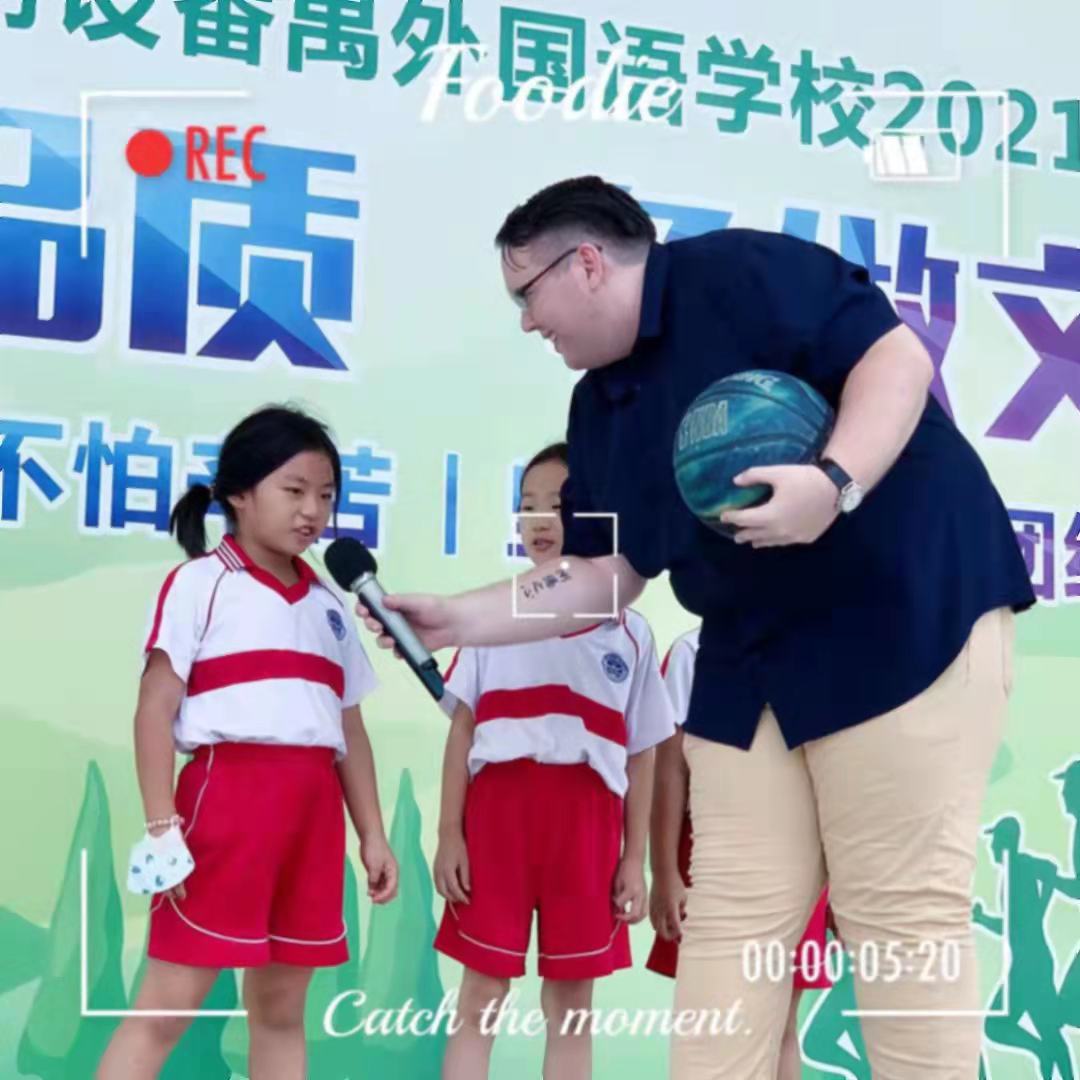Talking to Teachers – An Interview with Jerimiah Phillips
This school is holding interviews for teachers now. Submit your resume to set up an interview today. GS: So, can you tell us a bit about how you first got into English teaching? JP: I first became an English teacher in China after finishing my degree at university. My first teaching post was meant to be just a break point between my undergraduate and graduate program while having the advantage of being a good opportunity for some travel abroad. However, I took a very keen liking to teaching English to Chinese students that prolonged this experience. Seeing a student progress whether at the age of 3 or 13 still gives me a sense of accomplishment unlike anything I’ve experienced before. Being able to provide the educational underpinnings and guidance for students so that in turn they can go one to have a brighter future and better career is an element of this job that interested me when I started and keeps me motivated today. After almost 3 years of teaching in China, I don’t see this career trajectory changing very much. GS: Could you give some details about your dealings with Gold Star TEFL Recruitment? JP: In my experience working as an English teacher in China, I’ve depended greatly on recruiters across many companies for finding posts for myself and for hiring new teachers when I happened to find myself in management positions at some schools. My experience with Gold Start TEFL Recruitment primarily dealt with finding a new teaching post for myself after spending years at a pervious school. Throughout this process, Gold Star was very professional and helpful with setting up interviews and giving many options of schools to pick from. One of the aspects of Gold Start that I believe puts them a bit above the other recruitment companies I’ve worked with is that they are very detailed and are great at following up after interviews or contact with other schools. During my transitioning process between schools, Gold Star provided structured follow-ups and asked me for any details that would help match my experience with the correct school. GS: What advice do you have for people about the recruitment and interview process when looking for jobs teaching in China? JP: All the advice I have for the recruitment process is very simple. Your recruiter’s job is to help match you with the best school that fits your experience and expectations. So firstly, I suggest sitting down and making sure you know what you want and what kind of school do you see yourself in? If you have a clear vision for the position and school you want, that makes the recruiter’s job that much easier. There are so many opportunities for teachers in China that there shouldn’t be too much of an issue finding a school that is the correct fit for everyone. Communicating experience and expectations clearly is the key for developing a positive and efficient relationship between a teacher and a recruiter. Interviews are simple as well. Be yourself and be prepared to present your abilities as a teacher. I suggest keeping a file with lesson plans for various ages of classes or difference topics. Teaching videos are good examples to keep on file that show how you manage a classroom and actual teach a lesson. However, these are sometimes difficult to attain because of proprietary materials and coursework some schools don’t want open to the public. If videos aren’t possible, be prepared to do demo classes in person at the school or online via one of the various video chat software. Online teaching demos can be tough for both the teacher and the interviewer so make sure to have something visual to present and be fairly active in the demo class. GS: You are teaching in Guangzhou at the moment, can you tell us about your impressions of the city? What do you like most about living there? JP: My experience in Guangzhou is quite a change from my previous city. After living in China for almost three years, I’ve grown accustomed to the environment of northern China. My previous work was done mainly in Inner Mongolia so moving to a place where bananas and mangos grow on trees right by the street is very different. Getting use to the humidity and rain has been an experience, but it is a lot better than dealing with the cold and snow up north. Guangzhou is a much more international city. Seeing other foreigners on the streets and meeting new people is a common daily occurrence here. Eating at a lot of foreign restaurants that have food that I have missed from back home is a great experience. This international community is more diverse and exciting. I’ve enjoyed making new friends and meeting new people even in this short time. In my free time, I enjoy taking walks around my neighborhood and getting know the other local people in the area as well.The food in Guangzhou has interesting spices and flavors that are different then the food in the north. We rarely ate seafood beside fish, but now we are enjoying many different types of tropica

This school is holding interviews for teachers now. Submit your resume to set up an interview today.
GS: So, can you tell us a bit about how you first got into English teaching?
JP: I first became an English teacher in China after finishing my degree at university. My first teaching post was meant to be just a break point between my undergraduate and graduate program while having the advantage of being a good opportunity for some travel abroad. However, I took a very keen liking to teaching English to Chinese students that prolonged this experience. Seeing a student progress whether at the age of 3 or 13 still gives me a sense of accomplishment unlike anything I’ve experienced before. Being able to provide the educational underpinnings and guidance for students so that in turn they can go one to have a brighter future and better career is an element of this job that interested me when I started and keeps me motivated today. After almost 3 years of teaching in China, I don’t see this career trajectory changing very much.
GS: Could you give some details about your dealings with Gold Star TEFL Recruitment?
JP: In my experience working as an English teacher in China, I’ve depended greatly on recruiters across many companies for finding posts for myself and for hiring new teachers when I happened to find myself in management positions at some schools. My experience with Gold Start TEFL Recruitment primarily dealt with finding a new teaching post for myself after spending years at a pervious school. Throughout this process, Gold Star was very professional and helpful with setting up interviews and giving many options of schools to pick from.
One of the aspects of Gold Start that I believe puts them a bit above the other recruitment companies I’ve worked with is that they are very detailed and are great at following up after interviews or contact with other schools. During my transitioning process between schools, Gold Star provided structured follow-ups and asked me for any details that would help match my experience with the correct school.
GS: What advice do you have for people about the recruitment and interview process when looking for jobs teaching in China?
JP: All the advice I have for the recruitment process is very simple. Your recruiter’s job is to help match you with the best school that fits your experience and expectations. So firstly, I suggest sitting down and making sure you know what you want and what kind of school do you see yourself in? If you have a clear vision for the position and school you want, that makes the recruiter’s job that much easier. There are so many opportunities for teachers in China that there shouldn’t be too much of an issue finding a school that is the correct fit for everyone. Communicating experience and expectations clearly is the key for developing a positive and efficient relationship between a teacher and a recruiter.
Interviews are simple as well. Be yourself and be prepared to present your abilities as a teacher. I suggest keeping a file with lesson plans for various ages of classes or difference topics. Teaching videos are good examples to keep on file that show how you manage a classroom and actual teach a lesson. However, these are sometimes difficult to attain because of proprietary materials and coursework some schools don’t want open to the public. If videos aren’t possible, be prepared to do demo classes in person at the school or online via one of the various video chat software. Online teaching demos can be tough for both the teacher and the interviewer so make sure to have something visual to present and be fairly active in the demo class.
GS: You are teaching in Guangzhou at the moment, can you tell us about your impressions of the city? What do you like most about living there?
JP: My experience in Guangzhou is quite a change from my previous city. After living in China for almost three years, I’ve grown accustomed to the environment of northern China. My previous work was done mainly in Inner Mongolia so moving to a place where bananas and mangos grow on trees right by the street is very different. Getting use to the humidity and rain has been an experience, but it is a lot better than dealing with the cold and snow up north.
Guangzhou is a much more international city. Seeing other foreigners on the streets and meeting new people is a common daily occurrence here. Eating at a lot of foreign restaurants that have food that I have missed from back home is a great experience. This international community is more diverse and exciting. I’ve enjoyed making new friends and meeting new people even in this short time. In my free time, I enjoy taking walks around my neighborhood and getting know the other local people in the area as well.
The food in Guangzhou has interesting spices and flavors that are different then the food in the north. We rarely ate seafood beside fish, but now we are enjoying many different types of tropical seafoods every week. The restaurants are very vibrant down here and are very warm and welcoming to foreigners. Other teachers in the area have had great recommendations for local places that I will for sure be checking out during my time here.
GS: Can you tell us about your favourite class at the moment?
 JP: One of my 2nd grade classes is very fun and full of energy. My favorite classes to teach are when the traditional positions of the teacher and the students are kind of dropped for a few minutes and what is left is just a single group enjoying a topic and speaking with each other. For example, I was teaching animals and the various habitats that they live in with this class when we started discussing colder climates like Antarctica. We sat on that section of the class for almost 20 minutes just talking about why rabbits in Guangzhou and rabbits in Antarctica were different colors. Discussing ideas of snowy weather and camouflage (at a limited ability) in this 2nd grade class was a great experience
JP: One of my 2nd grade classes is very fun and full of energy. My favorite classes to teach are when the traditional positions of the teacher and the students are kind of dropped for a few minutes and what is left is just a single group enjoying a topic and speaking with each other. For example, I was teaching animals and the various habitats that they live in with this class when we started discussing colder climates like Antarctica. We sat on that section of the class for almost 20 minutes just talking about why rabbits in Guangzhou and rabbits in Antarctica were different colors. Discussing ideas of snowy weather and camouflage (at a limited ability) in this 2nd grade class was a great experience
especially this early in the semester.
GS: Talk us through a typical day teaching English in China.
JP: One of the issues that I’ve been getting use to is teaching around 30 kids in one class. At my previous job class sizes were smaller. The biggest class was only ever around 16 students. So, a lot of my games and activities have needed to be adapted or changed. As well as, developing new games to keep students engaged in class. One of the positive things about the class size is the number of interactions the kids can have with each other has expanded exponentially from what I’ve previously been able to achieve. All the kids can have a partner for speaking activities and group work is more effective here as well. I’ve mostly been teaching the 2nd grade since coming to this school. These kids are full of energy and excited to speak English with their teachers. Speaking activities and games have been easy to in these classes because of the energy the kids have for speaking English.
GS: China is full of surprises and unexpected adventures, tell us about one you have had recently.
JP: I get lost a lot which I’m sure is something most other foreign teachers can relate too. Especially when moving and adapting to a different city. One night, I misjudged the battery on my scooter and was left a few kilometers away from my apartment right after the sun had gone down and was a bit turned around. My phone’s battery was almost dead, so I was only looking at maps intermediately to find my way back. However, I ran into some very friendly locals who helped me with my scooter and walked with me most of the way back to my apartment. My Chinese is pretty bad and their English wasn’t great either, but it ended up being a fun evening of conversation and a start of some new friendships.












